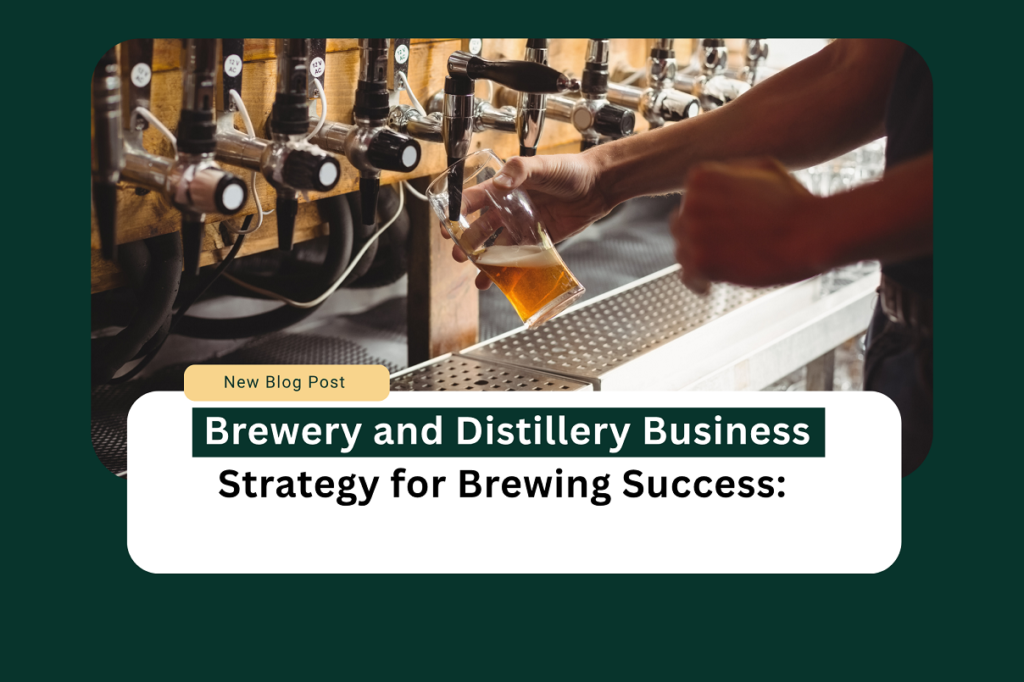Introduction
The American beverage industry has experienced dramatic changes because independent producers now set new expectations for consumers. A clear business plan is now essential for business growth and success in the craft brewery and distillery industry. This article provides vital information about creating successful strategies by presenting relevant data points for understanding this evolving market. This discussion will examine the necessary components which sustain profitability while ensuring long-term business sustainability including regulatory compliance and customer base development.
Understanding the Market
The craft beverage market demonstrates a focus on local manufacturing and it values both product quality and continuous product development. Today’s consumers seek distinctive authentic experiences and they will spend extra money on premium-quality items. The Brewers Association reveals that the U.S. economy received $62 billion from the craft brewing sector during 2021. The Brewers Association’s Economic Impact demonstrates the extensive economic power and market capacity of craft breweries.
The craft distilling industry has shown major expansion in recent times. The American Craft Spirits Association documents that the craft spirits sector expanded its revenue by 20% during 2022. The “greed” factor operates through these growth figures which demonstrate financial potential in this expanding market according to ACSA Craft Spirits Data. A successful business strategy for craft breweries and distilleries needs to use these market trends to meet the rising interest in artisanal beverages.
Build a Special Brand Personality
Your brewery or distillery needs a robust brand identity to stand apart from other competitors in the market. Your brand establishment requires a powerful narrative alongside an attractive visual design and products that match your customer base preferences. Your business should present multiple style options alongside distinctive flavors to address different customer tastes as you demonstrate your specialized skills through creative approaches.
The same brewery produces hop-forward IPAs and barrel-aged stouts, while the distillery creates small-batch whiskeys and botanical gins. Success in the market requires businesses to find their specific product area and create distinctive offerings among competing products.
Navigating Regulatory Hurdles and Compliance
Compliance with all local state and federal laws remains essential for the alcohol industry because its operations receive strict oversight. Operating within the regulatory framework demands compliance with numerous permits and licenses and strict tax regulations and labeling requirements, which create substantial challenges for businesses. Failure to meet these requirements will lead to serious financial penalties which could potentially end the operation. An effective business strategy for craft breweries and distilleries should contain methods to handle their legal obligations.
Each state maintains unique rules that businesses must understand before operating within their jurisdiction. Businesses that seek alcohol industry legal expertise receive help to maintain compliance standards while decreasing their exposure to potential risks. The process contains a “fear” element, which showcases the dangers that come from not following the rules.
A strong distribution strategy and sales operations are the cornerstones of a successful implementation.
Building a superior distribution network and sales system remains vital to reaching customer markets with your products. Your success relies on choosing target markets, followed by distributor and retailer partnership building plus strategic marketing methods and sales plans. Your business should use a three-part sales model that combines direct customer purchases with bar and restaurant sales and distribution to liquor stores and bottle shops.
Your business will gain valuable profits through direct-to-consumer sales since these channels help you establish personal relationships with customers at higher prices. Your profit will increase when you spend money to create a simple e-commerce platform and offer personalized brewery and distillery tours combined with tasting sessions for customers who buy directly from you.
Creating a Memorable Customer Experience
Craft beverage enterprises place customer experience as their highest priority. Every customer who steps into your taproom or tasting room experiences a sense of welcome along with active engagement from the very beginning. Your establishment should offer a welcoming environment together with skilled service and distinctive experiences that distinguish it from others.
The combination of concerts with food pairing events along with educational workshops helps both draw new customers and preserve existing ones. Big brand communities formed by your company lead to dedicated supporters who naturally share information about your products. Nielsen CGA reports that experiencing quality during bar or restaurant visits drives 73% of consumers to come back. Your craft brewery and distillery business strategy needs a well-designed customer experience according to Nielsen CGA Customer Experience. (Source: Nielsen CGA Customer Experience)
Financial Planning and Sustainability
Developing a solid financial structure stands as the foundation for extended operational excellence in your brewery or distillery business. The foundation for success requires a practical budget creation followed by proper funding acquisition and skilled cash flow management. You should establish cost-control mechanisms through process optimization and beneficial supplier agreements to achieve better profitability.
Your business gains a superior brand reputation through sustainable investments which helps you draw environmentally sensitive consumers to your products. The restaurant should adopt energy-efficient appliances as well as decrease water use and obtain ingredients from nearby local farms.
Social media use and digital marketing
A powerful digital platform functions as essential for businesses to connect with their target audience in the modern era of technology. Companies need to build complete digital marketing tactics supported by simple websites, attention-grabbing social media marketing, and relevant online ads. Social platforms make excellent channels to present your items while delivering brand heritage information as well as sustaining relationships with customers.
Social media platforms can be used for product launch announcements together with event promotion and presenting unique promotional offers. The development of a dynamic interactive community online results in improved brand recognition along with stronger customer-brand connections.
Continuous Innovation and Adaptation
A successful craft brewery and distillery business strategy must adapt to changes because the craft beverage industry develops constantly. The business requires constant monitoring of industry developments and experimentation with new components and processing methods along with consumer preference changes. Your strategy will achieve enduring success by conducting periodic performance assessments which lead to strategic adjustments.
A successful craft brewery and distillery business strategy develops when businesses combine their passion with creative thinking and business management expertise. A thriving business emerges from your dedication to quality and brand building combined with outstanding customer service delivery in a competitive market.
Please feel free to tell us your thoughts regarding a successful craft beverage business establishment and share any wisdom you might possess. This article presents valuable information about creating effective strategies, so share it on your social networks to benefit others who want to learn these essential principles.
FAQ
Does your market require distinct branding to succeed? Unique branding stands as an essential factor because it creates customer differentiation and builds devoted customer loyalty.
What regulatory hurdles exist? Three main obstacles for this market sector include licensing requirements as well as label regulations and tax compliance obligations.
What strategies should I use to build loyal customers? Provide distinctive encounters alongside social media interaction to reach your audience.
Are direct-to-consumer sales viable? The strategy leads to both profit improvement and enhanced customer relationships.
What steps can I take to guarantee lasting business achievement? Through continuous innovation and financial planning.
Read More : Cybersecurity services business blueprint








